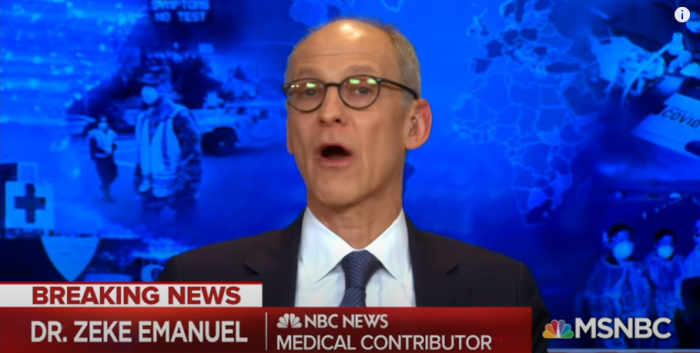4 things to know about Biden's proposed COVID-19 Advisory Board

1. Dr. Ezekiel Emanuel has spoken out in favor of healthcare rationing
One of the members of Biden’s proposed COVID-19 Advisory Board is Dr. Ezekiel Emanuel, a frequent cable news guest who is sometimes referred to as the “architect” of Obamacare. Emanuel has spoken out in favor of rationing healthcare by withholding or withdrawing medical care from the elderly in favor of redistributing it to those at risk of “dying young and not having a full life.”
Earlier this year, Emanuel co-authored an article in The New England Journal of Medicine titled “Fair Allocation of Scarce Medical Resources in the Time of Covid-19.” In the article, Emanuel and his co-authors suggested that “maximizing benefits is most important” when deciding “who gets health resources in a COVID-19 pandemic.”
“Operationalizing the value of maximizing benefits means that people who are sick but could recover if treated are given priority over those who are unlikely to recover even if treated and those who are likely to recover without treatment,” they wrote. “Because maximizing benefits is paramount in a pandemic, we believe that removing a patient from a ventilator or an ICU bed to provide it to others in need is also justifiable and that patients should be made aware of this possibility at admission.”
While Emanuel and his co-authors admitted that “withdrawing ventilators or ICU support from patients who arrived earlier to save those with better prognosis will be extremely traumatic for clinicians,” they concluded that “the decision to withdraw scarce resources to save others is not an act of killing and does not require the patient’s consent.”
In 2014, Emanuel wrote an article for The Atlantic explaining “Why I hope to die at 75.” He attempted to make an argument that “society and families—and you—will be better off if nature takes its course swiftly and promptly.”
After acknowledging that “death is a loss,” Emanuel contended that “living too long is also a loss.” “It renders many of us, if not disabled, then faltering and declining, a state that may not be worse than death but is nonetheless deprived.”
“It robs us of our creativity and ability to contribute to work, society, (and) the world. It transforms how people experience us, relate to us, and, most important, remember us. We are no longer remembered as vibrant and engaged but as feeble, ineffectual, even pathetic,” he added.
In spite of his desire to die at age 75, Emanuel stressed that he opposes legalizing “euthanasia and physician-assisted suicide.” Still, he predicted that his approach to healthcare will “completely change” when he reaches the age of 75: “I won’t actively end my life. But I won’t try to prolong it either.” Emanuel said that he would refuse cancer treatment and screening, preventative measures and flu shots after turning 75.




























